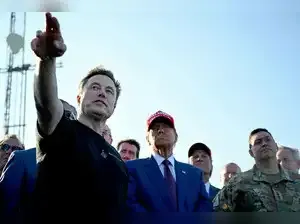The White House has begun reviewing contracts awarded to Elon Musk’s SpaceX after tensions between the billionaire and President Donald Trump spilled into the public. According to The Wall Street Journal, the administration launched the review to “identify potential waste in agreements worth billions of dollars,” citing sources familiar with the process.
While Musk and SpaceX have not commented, government officials soon concluded that most of these contracts could not be dropped. Their importance to the Department of Defense and NASA made them virtually untouchable.
The review also extended beyond SpaceX. A White House official confirmed that the assessment included several companies with lucrative government contracts.
Only days later, on 9 June, Josh Gruenbaum, Commissioner of the Federal Acquisition Service at the General Services Administration (GSA), sent an email to the Department of Defense. He requested a complete spreadsheet listing SpaceX contracts and other transaction agreements. According to the Journal, the data was intended for the White House.
The same request was made to NASA and at least five other agencies. These spreadsheets—internally referred to as "scorecards"—detailed the value of each contract and evaluated whether other companies could do the same job more effectively.
But when officials at the Pentagon and NASA reviewed the findings, the answer was clear: the majority of SpaceX's deals were too essential to walk away from. Some contracts might face ongoing scrutiny, according to sources, but a wholesale exit was not an option.
After Musk’s online criticism, Trump's decision to publicly question SpaceX’s funding marked a rare move against a key government contractor. But as the data rolled in, the limits of political retaliation became evident.
As reported by the WSJ, during the review, SpaceX President Gwynne Shotwell met with White House officials. Details of the discussions remain undisclosed, but her presence highlights the seriousness of the process.
The review brought to light a fact US officials have long understood: the country has few viable alternatives to SpaceX.
The company dominates the commercial launch industry. Its Falcon rockets, equipped with reusable boosters, have become the mainstay for launching government payloads. Its Crew Dragon capsule is currently the only American spacecraft certified to carry astronauts to the International Space Station.
In May, SpaceX launched an upgraded GPS satellite for the US Space Force. In April, the Pentagon awarded the company 28 national-security flights worth $5.9 billion—more than any other bidder.
NASA has already scheduled another crewed mission with SpaceX later this month.
But the dependence cuts both ways. During the height of the Trump–Musk feud, Musk threatened to decommission Crew Dragon. He later reversed course. Even so, the statement caused concern within NASA, which has long sought to diversify its options for crewed missions.
Some agencies are actively pushing other providers to step up. Still, officials acknowledge that no one else can currently match SpaceX’s scale or performance.
Despite its dominance, the company insists it supports competition. "We win these contracts by offering the best prices and executing," Shotwell said at an investor event in November.
Even as scrutiny continues, SpaceX keeps expanding. Its Starlink satellite internet network now serves multiple government agencies. Meanwhile, Starshield, a separate SpaceX division, has secured classified contracts from US intelligence agencies.
While Musk and SpaceX have not commented, government officials soon concluded that most of these contracts could not be dropped. Their importance to the Department of Defense and NASA made them virtually untouchable.
The review also extended beyond SpaceX. A White House official confirmed that the assessment included several companies with lucrative government contracts.
What sparked it all
In early June, Musk began criticising Trump’s signature tax-and-spending bill on social media. What started as policy disagreement turned personal, prompting Trump to fire back. On 5 June, the president posted on Truth Social that the best way to save money was to “terminate” government contracts held by Musk’s companies.Only days later, on 9 June, Josh Gruenbaum, Commissioner of the Federal Acquisition Service at the General Services Administration (GSA), sent an email to the Department of Defense. He requested a complete spreadsheet listing SpaceX contracts and other transaction agreements. According to the Journal, the data was intended for the White House.
The same request was made to NASA and at least five other agencies. These spreadsheets—internally referred to as "scorecards"—detailed the value of each contract and evaluated whether other companies could do the same job more effectively.
But when officials at the Pentagon and NASA reviewed the findings, the answer was clear: the majority of SpaceX's deals were too essential to walk away from. Some contracts might face ongoing scrutiny, according to sources, but a wholesale exit was not an option.
From ally to adversary
Elon Musk was once close to Trump. He had a lead role in the Department of Government Efficiency, which aimed to reduce federal spending. That relationship has now unravelled.After Musk’s online criticism, Trump's decision to publicly question SpaceX’s funding marked a rare move against a key government contractor. But as the data rolled in, the limits of political retaliation became evident.
As reported by the WSJ, during the review, SpaceX President Gwynne Shotwell met with White House officials. Details of the discussions remain undisclosed, but her presence highlights the seriousness of the process.
The review brought to light a fact US officials have long understood: the country has few viable alternatives to SpaceX.
The company dominates the commercial launch industry. Its Falcon rockets, equipped with reusable boosters, have become the mainstay for launching government payloads. Its Crew Dragon capsule is currently the only American spacecraft certified to carry astronauts to the International Space Station.
In May, SpaceX launched an upgraded GPS satellite for the US Space Force. In April, the Pentagon awarded the company 28 national-security flights worth $5.9 billion—more than any other bidder.
NASA has already scheduled another crewed mission with SpaceX later this month.
But the dependence cuts both ways. During the height of the Trump–Musk feud, Musk threatened to decommission Crew Dragon. He later reversed course. Even so, the statement caused concern within NASA, which has long sought to diversify its options for crewed missions.
Competition still lags
SpaceX’s rise hasn’t gone unnoticed by competitors. Many rivals have struggled with delays and technical setbacks while building their own rockets and satellites. Government contracts have been structured to encourage more competition, but progress remains slow.Some agencies are actively pushing other providers to step up. Still, officials acknowledge that no one else can currently match SpaceX’s scale or performance.
Despite its dominance, the company insists it supports competition. "We win these contracts by offering the best prices and executing," Shotwell said at an investor event in November.
Even as scrutiny continues, SpaceX keeps expanding. Its Starlink satellite internet network now serves multiple government agencies. Meanwhile, Starshield, a separate SpaceX division, has secured classified contracts from US intelligence agencies.





